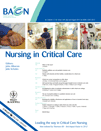
Nursing in Critical Care
Scope & Guideline
Championing the evolution of nursing practices in high-stakes environments.
Introduction
Aims and Scopes
- Patient-Centered Care:
Research focusing on the experiences and outcomes of patients in critical care settings, including family-centered approaches and interventions aimed at improving patient comfort and satisfaction. - Innovative Nursing Practices:
Exploration of novel nursing interventions and care models that enhance the effectiveness of critical care, including the implementation of nursing care bundles and the use of technology in patient monitoring. - Evidence-Based Guidelines:
Studies aimed at evaluating adherence to and the effectiveness of evidence-based guidelines in critical care nursing, particularly in managing complex conditions and preventing complications. - Mental Health and Well-Being:
Research addressing the psychological aspects of critical care, including the mental health of both patients and nurses, as well as interventions to support emotional well-being. - Education and Training:
Focus on educational initiatives for critical care nurses, including the development and assessment of training programs, and the exploration of knowledge gaps in nursing practice. - Sustainability and Ethical Practices:
Investigations into the environmental impact of critical care practices, ethical considerations in nursing care, and the role of nurses in promoting sustainability within healthcare. - Collaborative Care Models:
Research highlighting the importance of interdisciplinary collaboration in critical care settings, examining how teamwork among healthcare professionals can improve patient outcomes.
Trending and Emerging
- Telehealth and Digital Interventions:
With the rise of telehealth, there is a growing body of research focusing on the integration of digital tools in critical care settings, enhancing communication and patient engagement. - Interprofessional Collaboration:
Research emphasizing the importance of teamwork and collaboration among healthcare professionals in critical care has gained momentum, reflecting the complexity of patient care. - Mental Health Support for Healthcare Workers:
There is an increasing focus on the mental health and well-being of critical care staff, particularly in light of the COVID-19 pandemic, highlighting the need for support systems. - Patient and Family Engagement:
Emerging studies are focusing on strategies to involve patients and families in care decisions, recognizing their role in improving outcomes and satisfaction. - Sustainability in Healthcare Practices:
As environmental concerns grow, research into sustainable practices within critical care nursing is trending, addressing the ecological impact of healthcare. - Cultural Competence and Diversity in Care:
There is a rising interest in research that explores cultural competence in nursing practice, particularly in relation to diverse patient populations and their unique needs. - Holistic and Integrative Approaches to Care:
Research embracing holistic care models, including the use of complementary therapies and psychosocial support, is increasingly prevalent, reflecting a shift towards comprehensive patient care.
Declining or Waning
- Traditional Hierarchical Models of Care:
Research exploring rigid hierarchical structures in critical care nursing has decreased, indicating a movement towards more collaborative and egalitarian models of care. - Focus on Physical Restraint Practices:
There has been a noticeable decline in studies solely dedicated to the use of physical restraints, possibly reflecting a broader shift towards less restrictive practices and a focus on patient autonomy. - Single-Dimensional Approaches to Delirium Management:
There is a waning interest in studies that address delirium management through isolated interventions, as more integrated, multifaceted approaches gain traction. - Generalized Nurse Burnout Studies:
Research that broadly addresses nurse burnout without specific contextualization to critical care settings has become less prevalent, as more targeted studies focusing on specific stressors and coping mechanisms are favored. - Overemphasis on Technical Skills Training:
There is a diminishing focus on training that prioritizes technical skills over holistic care approaches, as the importance of emotional intelligence and patient engagement becomes more recognized.
Similar Journals

Revista Rol de Enfermeria
Catalyzing Change in Nursing Practices and PoliciesRevista Rol de Enfermeria, published by EDICIONES ROL S L, is a distinguished peer-reviewed journal that has been a cornerstone of nursing knowledge and practice since its inception in 1980. With a specific focus on the field of nursing and healthcare, this journal serves as a vital platform for researchers, clinicians, and educators to disseminate their findings, enhance professional practices, and support the development of evidence-based nursing care. Although its coverage in Scopus has been discontinued as of 2016, the journal has maintained an essential role in the nursing community, contributing to the advancement of general medicine as evidenced by its ranking in Scopus at #679 out of 862, placing it within the 21st percentile. While Revista Rol de Enfermeria does not currently offer an open access model, its historical significance and thematic relevance make it a valuable resource for professionals seeking to stay informed about the latest developments in nursing research and education. Situated in Barcelona, Spain, it continues to reflect the dynamic evolution of nursing practice across diverse healthcare landscapes.

Nursing Reports
Shaping the Future of Healthcare Through ResearchNursing Reports is a prominent open-access journal dedicated to disseminating scholarly research in the field of nursing and healthcare. Published by MDPI since 2020, the journal is based in Italy and features an ISSN of 2039-439X and an E-ISSN of 2039-4403. With rapid advancements in nursing practices and education, the journal serves as a vital platform for researchers, professionals, and students to share innovative findings and insights that enhance patient care and nursing methodologies. Recognized for its quality, the journal is ranked in the Q2 category in Nursing (Miscellaneous) for 2023, alongside a respectable position in the Scopus ranks, holding place #53 out of 139 in General Nursing, placing it in the 62nd percentile. The journal's commitment to fostering a collaborative research environment is underscored by its open-access model, allowing for unimpeded access to cutting-edge nursing research worldwide. As "Nursing Reports" continues to grow from its inception into its converged years spanning from 2014 to 2024, it plays a crucial role in the progression of the nursing profession and the overall healthcare landscape.
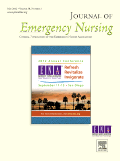
Journal of Emergency Nursing
Shaping Tomorrow's Emergency Care TodayJournal of Emergency Nursing, published by Elsevier Science Inc, serves as a premier platform for advancing the field of emergency nursing. Since its inception in 1975, this peer-reviewed journal has established itself as a vital resource for researchers, practitioners, and educators alike, with a notable impact factor and current ranking of #8 out of 32 in the Emergency Nursing category, placing it in the 76th percentile. The journal's commitment to the dissemination of high-quality evidence, innovative practices, and essential insights makes it an indispensable tool for those seeking to excel in acute care settings. Although not open access, the Journal of Emergency Nursing is dedicated to fostering knowledge and improving patient outcomes through robust research and comprehensive reviews, aligning closely with its mission to enhance emergency nursing practices and education through every issue until 2024 and beyond. For professionals and students keen on staying at the forefront of emergency care advancements, this journal provides a wealth of knowledge and resources, reflecting the critical issues and developments shaping the future of healthcare.

Recherche en Soins Infirmiers
Empowering healthcare professionals with vital knowledge.Recherche en Soins Infirmiers, published by the ASSOC RECHERCHE & SOINS INFIRMIERS in France, offers a vital platform for sharing innovative research and insights in the field of nursing care. With its ISSN 0297-2964 and E-ISSN 2271-8362, this journal serves as an essential resource for healthcare professionals, researchers, and students alike, striving to advance nursing practices and improve patient care. Although it currently holds a Q4 ranking in the 'Medicine (Miscellaneous)' category and occupies a position of rank #468 out of 636 in the Scopus General Medicine category, it is dedicated to fostering scholarly communication and collaboration. The journal's scope reflects a comprehensive approach to nursing theories, practices, and innovations from the years 1996 to 2022, with ongoing publications anticipated for 2024. Despite the absence of an open access model, the journal continues to publish works that address pressing healthcare challenges, thereby contributing significantly to the advancement of nursing as a discipline.
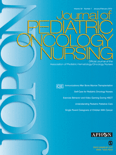
Journal of Pediatric Oncology Nursing
Empowering healthcare professionals in the fight against childhood cancer.The Journal of Pediatric Oncology Nursing, published by SAGE Publications Inc, serves as an essential resource for healthcare professionals and researchers dedicated to the field of pediatric nursing, particularly within oncology. With its ISSN of 1043-4542 and E-ISSN of 1532-8457, this journal has established itself as a key platform for disseminating high-quality research, innovative practices, and case studies that address the unique challenges faced in caring for children with cancer. Despite its coverage in Scopus being discontinued in 2021, the journal previously ranked 4th in the Nursing _ Pediatrics category, illustrating its impact with an 85th percentile rating, and it holds a 10th place rank in Nursing _ Oncology, demonstrating its ongoing relevance in the field. The journal's commitment to open access ensures that vital research findings are available to a global audience, assisting in the improvement of nursing practices and patient care. Engaging both seasoned professionals and aspiring researchers, the Journal of Pediatric Oncology Nursing continues to be a cornerstone for advancing knowledge and enhancing the quality of care for pediatric oncology patients.

Worldviews on Evidence-Based Nursing
Fostering excellence in nursing through scholarly dialogue.Worldviews on Evidence-Based Nursing, published by WILEY, is a premier journal dedicated to advancing the field of nursing through the dissemination of high-quality research and innovative practices. With an impressive impact factor and recognition as a Q1 journal in both Medicine (miscellaneous) and Nursing (miscellaneous), this journal stands at the forefront of evidence-based nursing, providing a vital platform for researchers and professionals to share their findings. Established in 2004, the journal has continually fostered an interdisciplinary approach, welcoming submissions that reflect diverse perspectives within nursing and healthcare. While it does not currently offer open access, its rigorous peer-review process ensures that published articles meet the highest standards of scientific excellence. As the journal moves toward its converged years of publication until 2024, it remains committed to shaping the future of nursing practice through evidence and inquiry, making it an essential resource for dedicated scholars and practitioners alike.
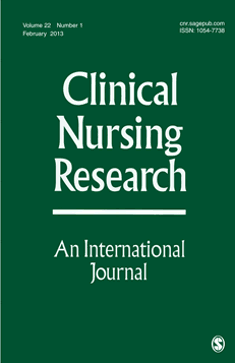
Clinical Nursing Research
Fostering innovation in nursing scholarship since 1992.Clinical Nursing Research is a premier academic journal dedicated to advancing the discipline of nursing through rigorous research and evidence-based practice. Published by SAGE Publications Inc, this journal has been a cornerstone in the field since its inception in 1992, with a commitment to providing high-quality research that informs clinical practice and nursing education. With an impressive Scopus ranking of #40 out of 139 in the general nursing category and a percentile rank of 71, it represents a significant contribution to the nursing literature. Although not an open-access journal, Clinical Nursing Research facilitates access through institutional subscriptions, ensuring that critical findings are disseminated widely. The journal’s objectives include fostering innovation and promoting best practices in nursing, making it an indispensable resource for researchers, practitioners, and students alike. As it continues to evolve through 2024 and beyond, Clinical Nursing Research remains at the forefront of nursing scholarship, addressing the complexities of healthcare in a rapidly changing world.
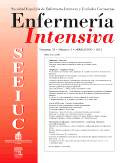
Enfermeria Intensiva
Exploring Excellence in Advanced Nursing and Critical CareEnfermeria Intensiva, published by Elsevier Science Inc, is a highly regarded journal in the fields of Advanced and Specialized Nursing as well as Critical Care and Intensive Care Medicine. With an impressive track record spanning from 1994 to 2024, this journal serves as a vital resource for researchers, healthcare professionals, and students dedicated to enhancing the quality of patient care in critical settings. It holds a coveted Q2 ranking in multiple nursing categories as of 2023, reflecting its influence and contribution to the ongoing discourse in nursing practices. Although currently not an open access journal, it continues to provide intricate insights into both fundamental skills and specialized techniques essential in intensive nursing care. By bridging research and practical application, Enfermeria Intensiva plays a pivotal role in advancing knowledge and improving outcomes in critical care environments.
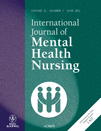
International Journal of Mental Health Nursing
Pioneering insights for the future of mental health nursing.International Journal of Mental Health Nursing is a prestigious peer-reviewed journal published by WILEY, dedicated to advancing the field of mental health nursing. With an ISSN of 1445-8330 and E-ISSN 1447-0349, the journal serves as a vital resource for researchers, clinicians, and educators within the psychiatry and mental health sectors. Ranked in the top Q1 quartile and recognized as Rank #4 out of 45 in the Nursing - Psychiatric Mental Health category, it boasts an impressive 92nd percentile ranking in Scopus metrics, underscoring its influence and reach within the academic community. Emphasizing original research, systematic reviews, and innovative clinical practices, the journal aims to bridge the gap between theory and practice, ultimately enhancing mental health care. The journal’s commitment to disseminating high-quality research ensures that it is an essential publication for anyone engaged in the evolving landscape of mental health nursing.
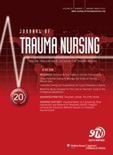
Journal of Trauma Nursing
Empowering Nurses with Cutting-Edge InsightsJournal of Trauma Nursing, published by LIPPINCOTT WILLIAMS & WILKINS, is a pivotal resource in the fields of trauma, critical care, and emergency nursing. With an ISSN of 1078-7496 and an E-ISSN of 1932-3883, this journal has been at the forefront of disseminating cutting-edge research and innovative practices since its inception in 1995, continuing through 2024. Positioned within the Q3 quartile of the Advanced and Specialized Nursing, Critical Care Nursing, and Emergency Nursing categories, it provides valuable insights into trauma care that enhance clinical practice and patient outcomes. The journal is recognized for its commitment to advancing knowledge and improving the quality of nursing care, making it an essential publication for researchers, practitioners, and students who are dedicated to the fields of trauma and emergency nursing. While currently not available as Open Access, it remains a reputable source of peer-reviewed content aimed at fostering a comprehensive understanding of trauma nursing. Located in the United States at TWO COMMERCE SQ, 2001 MARKET ST, PHILADELPHIA, PA 19103, the Journal of Trauma Nursing continues to impact the profession significantly.